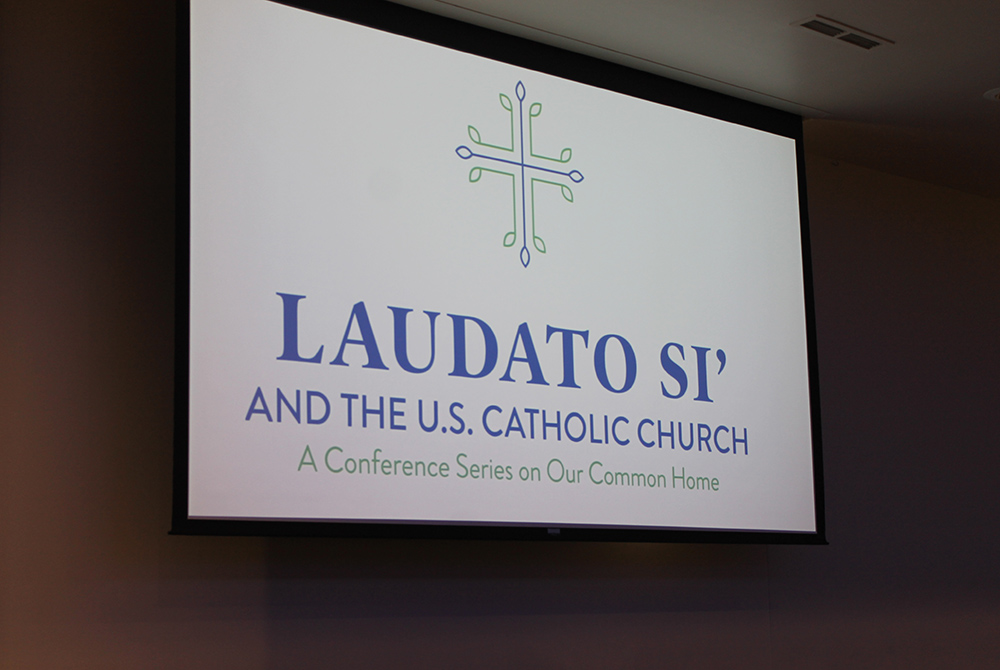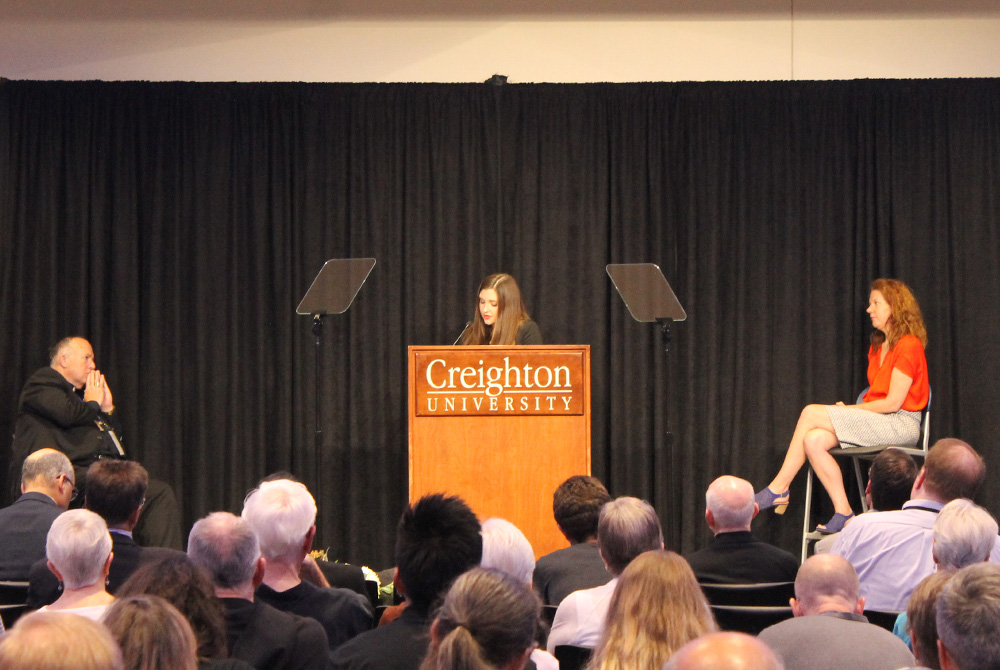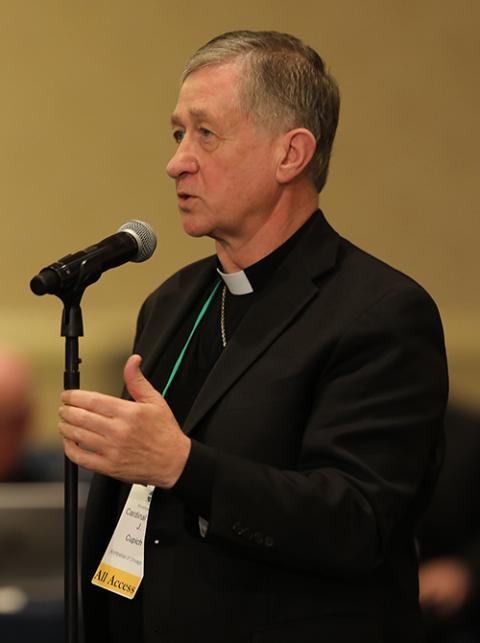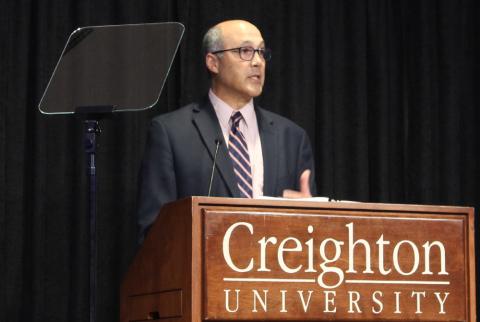
In June 2019, the Catholic Climate Covenant and Creighton University hosted the "Laudato Si' and the U.S. Catholic Church" conference, in Omaha, Nebraska, the first of three gatherings that aim to raise the response in the United States to Pope Francis' encyclical "Laudato Si', on Care for Our Common Home." The second conference will be held virtually July 13-15, 2021. (NCR photo/Brian Roewe)
Have Catholics in the United States made any progress in responding to environmental challenges? Have new pathways of cooperation opened up between the church and the White House under President Joe Biden? And how much enthusiasm is there across the country to join the Vatican's ambitious push toward total sustainability this decade?
All these questions will be topics of discussion at the "Laudato Si' and the U.S. Catholic Church" conference being held virtually July 13-15.
The conference is the second of three biennial gatherings organized and co-hosted by Catholic Climate Covenant and Creighton University. The series aims to raise ambition and action within the U.S. Catholic Church in responding to Pope Francis' 2015 encyclical "Laudato Si', on Care for Our Common Home."
Whereas the first conference, in 2019, assembled an invited list of approximately 200 Catholics from all facets of the church to the Creighton campus, in Omaha, Nebraska, this year's iteration will take place virtually, due to the coronavirus pandemic, and is open to the public. Registration is free, though organizers have requested donations to offset costs, such as Spanish translations.

Meghan Goodwin, associate director of the U.S. bishops' conference government relations office, speaks during the first "Laudato Si' and the U.S. Catholic Church" conference on June 27, 2019. Listening on stage were San Diego Bishop Robert McElroy and Martha Shulski, the Nebraska state climatologist. (NCR photo/Brian Roewe)
According to conference organizers, nearly 2,000 people already have registered, a signal they take that interest and urgency for a more robust Catholic response to climate change are both high.
"With the [Laudato Si'] Action Platform coming from the Vatican, especially with science continuing to come out about the emergency of the climate crisis, I think many people are coming to a much deeper understanding of the need to integrate Laudato Si' into the life of the U.S. church," said Dan DiLeo, a consultant with Catholic Climate Covenant and director of Creighton's justice and peace studies program.

Chicago Cardinal Blase Cupich speaks from the floor during the fall general assembly of the U.S. bishops' conference Nov. 11, 2019, in Baltimore. (CNS/Bob Roller)
The conference will open July 13 with an evening keynote event featuring Chicago Cardinal Blase Cupich and Maureen Day, an assistant professor of religion and society at the University of San Diego's Franciscan School of Theology. The discussion is expected to examine the so-far tepid response to Laudato Si' within the U.S. church. Earlier this year, Cupich identified a pervading libertarian worldview among some people of faith as one hurdle to a more robust American response to the encyclical.
Bishop Joseph Tyson of Yakima, Washington, who serves as episcopal liaison for the Covenant, is scheduled to deliver a reflection on St. Kateri Tekakwitha for her feast day, July 14. The conference will close the next day with an address from Franciscan Sr. Ilia Delio.
Other participants include Kathy Mears, interim president and CEO of the National Catholic Education Association; Chris Kerr, executive director of the Ignatian Solidarity Network; Kayla Jacobs, director of programs for Laudato Si' ministries in the Joliet, Illinois, Diocese; and Meghan Goodwin, associate director of government relations for the U.S. Conference of Catholic Bishops.
As in 2019, this year's conference is organized around eight ministerial tracks: advocacy, creation care teams, colleges and universities, parochial schools, preaching, communications and media, environmental justice, and youth and young adults. Breakout sessions on each will provide updates from working group leaders on the strategies and resources they have developed in the time since the last conference.
So far, the environmental justice track has been the most popular among registrants, followed by creation care teams and advocacy, according to organizers.
Many of the ministerial tracks overlap with the sectors or goals outlined in the Laudato Si' Action Platform developed by the Vatican Dicastery for Promoting Integral Human Development. The platform, introduced in May ahead of a full launch in October, is an effort to mobilize church institutions of all types and sizes around the world to commit to seven-year roadmaps toward carbon neutrality and sustainability inspired by the encyclical's messages.

Dan Misleh, executive director of Catholic Climate Covenant, speaks during the first "Laudato Si' and the U.S. Catholic Church" conference on June 27, 2019. (NCR photo/Brian Roewe)
It was at the 2019 Catholic Climate Covenant conference at Creighton where Salesian Fr. Joshtrom Kureethadam, head of the dicastery's ecology and creation sector, provided one of the first previews of the Vatican's ambitious plans. Catholic Climate Covenant is leading the U.S. rollout of the platform, and will provide an update during the conference.
In a letter to the conference, Cardinal Pietro Parolin, Vatican secretary of state, expressed "prayerful good wishes" from Francis that it "will contribute to the development of effective programs and practices at all levels of the Church within the United States to promote and enhance the care and protection of our common home."
Covenant executive director Dan Misleh said he has been encouraged by signs of progress already in the U.S. church in the two years between conferences.
One is the growing expansion of the Covenant's Catholic Energies program, which at Creighton was celebrating its first completed parish solar panel project. More parishes, schools and dioceses have also undertaken energy projects, while other parts of the church have looked at ways to use their finances to invest in climate solutions or divest from fossil fuels, including Creighton. Add to that a shift from defense to offense in advocating climate policies with the transition from former President Donald Trump to Biden.
Daniel DiLeo, assistant theology professor at Creighton University (NCR photo/Brian Roewe)
"It feels like there's been more momentum since 2019," Misleh said.
Still, the sense is there's not enough. At a lecture in March, DiLeo, a theologian specializing in environmental and climate ethics, said the U.S. church is failing to live up to its potential to be a major catalyst of action on climate change.
He told EarthBeat that while action is important, "it has to be underpinned by the fullness of faith," and that progress has been slower among Catholics to recognize creation care as essential to the church's mission. One reason has been the increasing polarization in the nation, along with the church, where studies have shown Laudato Si' has been received along ideological and partisan lines, he said.
"I think we have to still really recognize what have been some of the barriers since the release of Laudato Si' if we're going to be able to discern responses and pathways moving forward," he said.
Organizers hope the conference will continue to both build momentum for action and develop new strategies to break down continued resistance in the U.S. to Laudato Si' and to church teachings on care for the environment.
"We could talk about what to do and carbon neutrality dates and divestment," DiLeo said, "but if people don't appreciate the 'why' behind the 'what,' it's much more difficult to have those conversations."
Advertisement








